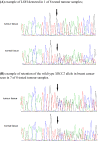Inherited variants in XRCC2 and the risk of breast cancer
- PMID: 31463769
- PMCID: PMC6817746
- DOI: 10.1007/s10549-019-05415-5
Inherited variants in XRCC2 and the risk of breast cancer
Abstract
Background: XRCC2 participates in homologous recombination and in DNA repair. XRCC2 has been reported to be a breast cancer susceptibility gene and is now included in several breast cancer susceptibility gene panels.
Methods: We sequenced XRCC2 in 617 Polish women with familial breast cancer and found a founder mutation. We then genotyped 12,617 women with breast cancer and 4599 controls for the XRCC2 founder mutation.
Results: We identified a recurrent truncating mutation of XRCC2 (c.96delT, p.Phe32fs) in 3 of 617 patients with familial breast cancer who were sequenced. The c.96delT mutation was then detected in 29 of 12,617 unselected breast cancer cases (0.23%) compared to 11 of 4599 cancer-free women (0.24%) (OR = 0.96; 95% CI 0.48-1.93). The mutation frequency in 1988 women with familial breast cancer was 0.2% (OR = 0.84, 95% CI 0.27-2.65). Breast cancers in XRCC2 mutation carriers and non-carriers were similar with respect to age of diagnosis and clinical characteristics. Loss of the wild-type XRCC2 allele was observed only in one of the eight breast cancers from patients who carried the XRCC2 mutation. No cancer type was more common in first- or second-degree relatives of XRCC2 mutation carriers than in relatives of the non-carriers.
Conclusion: XRCC2 c.96delT is a protein-truncating founder variant in Poland. There is no evidence that this mutation predisposes to breast cancer (and other cancers). It is premature to consider XRCC2 as a breast cancer-predisposing gene.
Keywords: Breast cancer; Hereditary; Mutation; XRCC2.
Conflict of interest statement
All authors declare no conflict of interest.
Figures
References
-
- Kurian AW, Hare EE, Mills MA, Kingham KE, McPherson L, Whittemore AS, McGuire V, Ladabaum U, Kobayashi Y, Lincoln SE, et al. Clinical evaluation of a multiple-gene sequencing panel for hereditary cancer risk assessment. J Clin Oncol. 2014;32:2001–2009. doi: 10.1200/JCO.2013.53.6607. - DOI - PMC - PubMed
-
- LaDuca H, Stuenkel AJ, Dolinsky JS, Keiles S, Tandy S, Pesaran T, Chen E, Gau CL, Palmaer E, Shoaepour K, et al. Utilization of multigene panels in hereditary cancer predisposition testing: analysis of more than 2,000 patients. Genet Med. 2014;16:830–837. doi: 10.1038/gim.2014.40. - DOI - PMC - PubMed
MeSH terms
Substances
Supplementary concepts
Grants and funding
LinkOut - more resources
Full Text Sources
Medical


